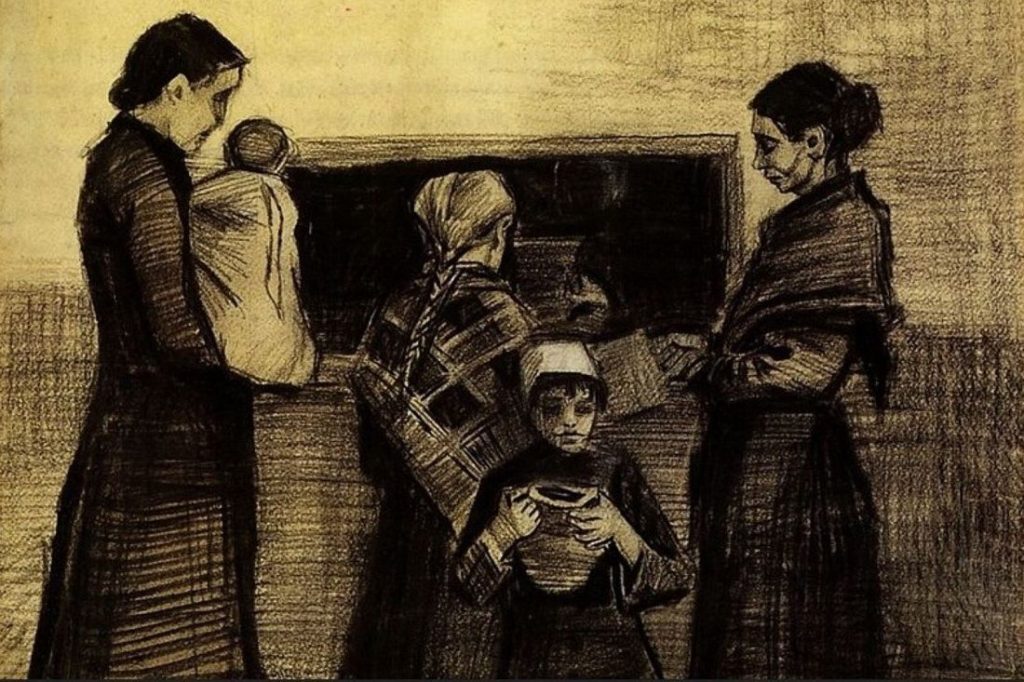An alternative means of reading the Lord’s Prayer is not spiritually, but economically. According to this article by David Bently Hart in Church Life Journal (June 5, 2018), Church Life Journal:
Again, though, as I have said, we rarely notice how persistent a theme the issue of indebtedness is in Christ’s teachings. And again, as I have also said, conventions of translation and habits of thought are chiefly to blame. In the actual text of the Sermon on the Mount, for instance, at least in the original Greek, an ominously archetypal figure, identified simply as “the wicked man” (ὁ πονηρός), makes a brief appearance. He is almost certainly meant to be understood as a depiction of the sort of avaricious, disingenuous, and rapacious man who routinely abuses, deceives, defrauds, and plunders the poor. It is he who ensnares men with false promises wrapped in a haze of preposterously extravagant oaths (Matt 5:37), and he whom Christ forbids his followers to “oppose by force” (Matt 5:39), and he from whom one should request deliverance whenever one comes before God in prayer (Matt 6:13). And yet in most translations—and, more generally, in Christian consciousness—he is all but invisible.
In the first instance, he is usually mistaken for the devil (quite illogically), while in the latter two he is altogether displaced by an abstraction, “evil,” which has no real connection to the original Greek at all. This is a pity. And, really, it is somewhat absurd. Christian tradition has produced few developments more bizarre, for instance, than the transformation of the petitionary phrases of the Lord’s Prayer in Christian thinking—and in Christian translations of scripture—into a series of supplications for absolution of sins, protection against spiritual temptation, and immunity from the threat of “evil.” They are nothing of the kind. They are, quite explicitly, requests for (in order): adequate nourishment, debt relief, avoidance of arraignment before the courts, and rescue from the depredations of powerful but unprincipled men. The prayer as a whole is a prayer for the poor—and for the poor only. To see this, one need only look at the text as it appears in the Gospel:
Πάτερ ἡμῶν ὁ ἐν τοῖς οὐρανοῖς·
ἁγιασθήτω τὸ ὄνομά σου·
ἐλθέτω ἡ βασιλεία σου·
γενηθήτω τὸ θέλημά σου, ὡς ἐν οὐρανῷ καὶ ἐπὶ γῆς·
τὸν ἄρτον ἡμῶν τὸν ἐπιούσιον δὸς ἡμῖν σήμερον·
καὶ ἄφες ἡμῖν τὰ ὀφειλήματα ἡμῶν, ὡς καὶ ἡμεῖς ἀφήκαμεν τοῖς ὀφειλέταις ἡμῶν·
καὶ μὴ εἰσενέγκῃς ἡμᾶς εἰς πειρασμόν, ἀλλὰ ῥῦσαι ἡμᾶς ἀπὸ τοῦ πονηροῦ.Most Christians who recite the Lord’s Prayer in English—or what they take to be the Lord’s Prayer—could be pardoned for failing to imagine what is at stake in these lines. The standard rendering, after all, quite successfully dissolves the hard, mundane, practical substance of those petitions into vague, ethereal, painless pieties.
And, admittedly, the familiar translation of the prayer’s first half is sound enough; Christ did instruct his listeners to address God as their Father in “the heavens,” to hallow his name, to entreat the Kingdom’s advent, and to wish for God’s will to be accomplished here below as there above. But, the second half it reduces to something less than a shadow of the original. “Daily bread,” admittedly, is almost accurate enough, though the phrase would better be rendered “bread adequate for the day’s needs”; but I doubt most of us quite hear the note of desperation in that phrase “τὸν ἄρτον ἡμῶν τὸν ἐπιούσιον δὸς ἡμῖν σήμερον”—the very real uncertainty, suffered every day, concerning whether today one will have enough food to survive.
The next lines, moreover, the standard rendering comes nowhere near representing correctly. Simply said, ὀφειλήματα are not “transgressions,” but “debts”; nor are they “debts” in a metaphorical sense—they are not sins that require some penance or recompense on out part—but are in fact quite literally the crushing burden of financial obligations under which the poor labor and suffer and die, to the advantage of the most merciless of their creditors.
And the imperative ἄφες is a plea not for forgiveness in the moral sense, but for remission of those obligations. As for the word πειρασμός, it certainly ought not to be read as “temptation” (as though it could be applied to a roving eye, a longing for chocolate, or an inclination toward embezzlement); it properly means “trial,” and here almost certainly refers to literal trial in court under a suit brought by a creditor. And the closing petition’s final invocation of “the evil man”—not “evil” in the abstract, nor even the “evil one” in the sense of the devil—is almost certainly a reference to a creditor of an especially heartless and unscrupulous kind.
Perhaps, then, a more faithful rendering of those petitions would be something along the lines of:
Give us our bread today, in a quantity sufficient for the whole of the day. And grant us relief from our debts, to the very degree that we grant relief to those who are indebted to us. And do not bring us to court for trial, but rather rescue us from the wicked man.
It is easy to understand, obviously, how it is that over the centuries the Lord’s Prayer should have come to be something else in the Christian imagination—something less specific, less concrete, more comprehensive, more unrelated to any specific economic conditions or any particular station in society.

